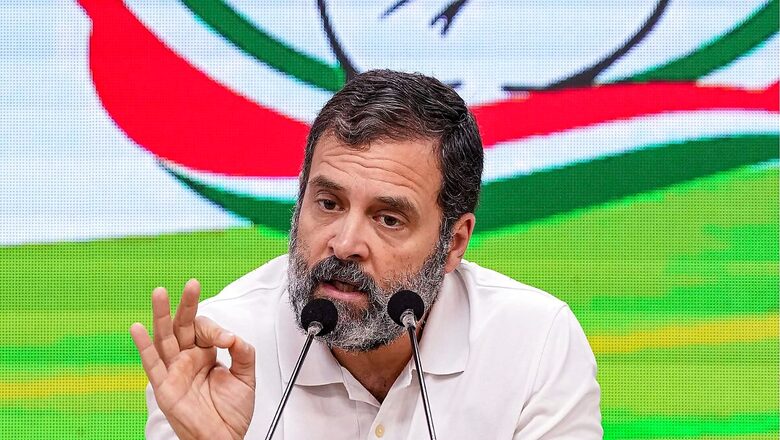
views
Former Congress MP Rahul Gandhi’s contention that he did not have ‘bad intentions’ in equating the Modi surname with ‘thief’ could be true, to the extent that he may have had a single target in mind and not all the Hindus, Muslims and Parsis who bear that name. The question is why he felt free to make so potentially offensive a remark in a public forum?
The founder of Modinagar (and Lalit Modi’s grandfather), Gujarmal Modi, might well have taken objection to the “why do all thieves have Modi as the common surname?” characterisation. So might the late Russi Mody, ‘the steel man of India’, or for that matter, the late thespian and filmmaker Sohrab Modi. Either this did not occur to the Congress scion, or if it did, the temptation to smear one particular Modi was so overwhelming that he ignored the unwisdom of tarring whole groups of people.
Would Gandhi have felt equally free to impugn the Yadav surname, borne by millions of people including the head of the Rashtriya Janata Dal (RJD), a party that has proved to be a loyal ally of the Congress? Imagine the response of Samajwadi Party (SP) leader Akhilesh Yadav or RJD’s Tejaswi Yadav to such a remark! Indeed, if any individual were to ask themselves whether they would tolerate a similar observation vis-a-vis their surname, the answer would most likely be a resounding ‘no’!
At one point, after the Harshad Mehta, Rajendra Sethia and Jain diaries imbroglios, a common joke in metropolitan circles was that ‘a Jain’ was behind every financial scam. But no sensible individual and certainly no politician dreamed of saying so from a public platform. Yet, Gandhi had no hesitation in conflating the Nirav Modi bank scam and the Lalit Modi-BCCI (Board of Control for Cricket in India) scandal with alleged financial mismanagement in the procurement of Rafael fighter planes for the Indian Air Force – for which he held Prime Minister Narendra Modi singularly responsible.
The dangerous aspect of such flippant observations is that they end up creating a stereotype, which can potentially fuel social tensions. The term Yadav, for instance, calls to mind someone from an agricultural/pastoral background, given to wrestling and other martial pursuits, uniting behind leaders with Robin Hood personas. But the media focuses on their muscular politics and the presence of Yadav-led criminal gangs in Western Uttar Pradesh which led to the ‘gunda’ trope, until a more progressive version of the party emerged.
Likewise, the Baniya community is equated with business acumen, and certain negative traits like ruthless profiteering, manipulation and morally dubious financial practices. At the same time, ‘seths’ are credited with philanthropic endeavours and public works, which mitigates the negative view. Politicians may target individual businessmen for controversial deals, but will not diss the community as a whole.
Stereotypes are often misleading. They are generalisations, often oversimplified, about a group of people or even whole nations. Germans are seen as efficient, industrious and stolid, Americans as brash, consumerist and gun-toting and the Chinese as inscrutable. Such tropes are often subject to change. The myth of the ‘Hindu rate of growth’ persisted for years; today, India is one of the fastest-growing economies in the world.
Consider the Sikhs of Punjab, long regarded as martial, hot-headed as they were hard-working and distinguished by unshakeable loyalty and integrity. For young girls in Delhi, until the 1980s, a three-wheeler or taxi driver who wore a turban spelled ‘safety’. In any sticky situation, you looked to a Sikh gentleman for protection. All that changed during the Rajiv Gandhi years and it took a decade to erase ‘Khalistan’ from the public lexicon.
The best-case construction that can be put on Gandhi’s remark is that it arose from sheer naivete. Given that he had been in active politics for over 15 years at that point, and had studied the complexities of India’s social framework, it seems unlikely. On the other hand, he recently made a negative comment about Veer Savarkar, thereby offending Congress allies in Maharashtra.
Even if Gandhi is absolved of malicious intent against any but a single individual, he must be made aware of the implications of his controversial speech. As the de facto leader of India’s main Opposition party, every sentence he speaks carries weight. It is a reflection not of his personal views and sentiments, but the policies of the Indian National Congress.
His advisors should have told him that attacking PM Modi is one thing, but making a negative reference to a generic surname is another. In so doing, he risked upsetting not just several communities, but projected himself as anti-OBC. Given that OBCs have been the protagonists in recent elections, and are aligned with the BJP in North India, it was a serious misstep.
The argument that ‘others have said worse’ is not a justification. Yes, politicians have made extremely misogynistic statements and have gotten away with an apology. Personal attacks have been vicious, and both Gandhi and Modi have received more than their fair share of those. But in referring to a particular community, Gandhi inadvertently handed the BJP ammunition. It was bound to come back and bite him. Now it has.
As Gandhi approaches the courts for relief, they may well take a lenient view, particularly if he apologises for giving offence. At the same time, they must caution him to ‘mind his language’.
Bhavdeep Kang is a freelance writer and author of ‘Gurus: Stories of India’s Leading Babas’ and ‘Just Transferred: The Untold Story of Ashok Khemka’. A journalist since 1986, she has written extensively on national politics. Views expressed are personal.
Read all the Latest Opinions here




















Comments
0 comment